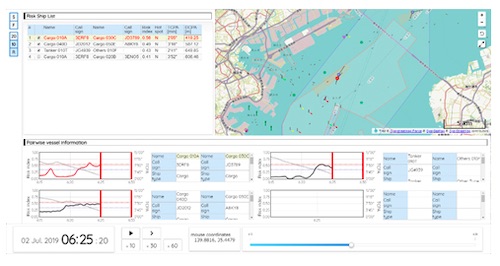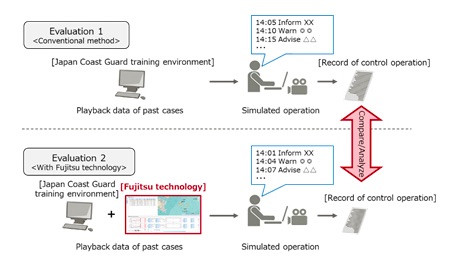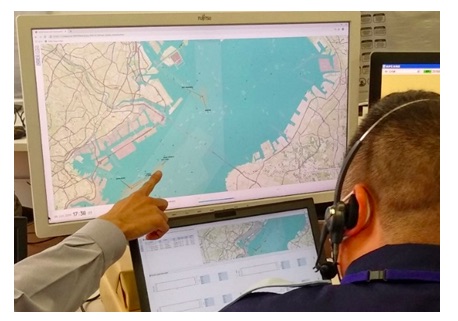|
Fujitsu Verifies AI Technology to Predict Vessel Collision Risks in Marine Traffic Control, Improves Maritime Safety
News Facts:
- Large vessel collisions have a major impact on society, affecting lives and polluting the sea
- Fujitsu's AI technology quickly detects vessel collision risks and minimizes the risk of such accidents, field trial confirms
- The technology shortens the operation time by approximately two minutes and enables accurate, consistent operation regardless of the controllers' experience, ensuring safe maritime traffic
TOKYO, Apr 15, 2020 - (JCN Newswire) - Fujitsu Limited today announced the results of a joint field trial with the Japan Coast Guard to predict vessel collisions with AI technology, demonstrating its usefulness in detecting collision risks early and minimizing the danger of such accidents. The trial in Japan marine traffic control was conducted from December 2019 to March 2020 at the Tokyo Wan Vessel Traffic Service Center(1), which offers navigation support services, under an outsourcing contract with the Japan Coast Guard.
 | | Screen image of vessel collision prediction technology | | |
 | | Evaluating the practicality of control operations | | |
 | | Evaluation by operation controller at the Tokyo Wan Vessel Traffic Service Center | | |
Leveraging Fujitsu Human Centric AI Zinrai developed by Fujitsu Laboratories Ltd., this technology can detect near-misses between vessels and predict areas where collision risks are concentrated in the Tokyo Bay. By applying this technology to the Vessel Traffic Services (VTS) system(2) used in maritime traffic control operations, Fujitsu has confirmed that it can contribute to the risk prevention of vessels and improve maritime traffic safety.
Beginning in April 2020, Fujitsu will bolster its business structure in safe navigation support, promoting the use of this technology in marine traffic control and offering safe navigation support services for marine traffic control and operating vessels.
Background
According to a report by the Japan Transport Safety Board(3), there were 2,863 marine collision accidents in Japan alone between 2009 and 2019, with an average of 286 accidents per year. Collisions involving large vessels can have a major impact on society, in terms of crew safety, damage to vessels, and marine pollution. The Japan Coast Guard operates a navigation support system that combines radar and the Automatic Identification System (AIS) for high-traffic routes, as they ensure maritime traffic safety by conducting navigation support services at such places including the Traffic Advisory Service Center.
However, it is not easy to recognize and predict the movements of a large number of vessels in addition to detecting risks. Therefore, the detection of risks and the timing of risk recommendations to vessels depends on the experience and skill of the operation controllers. To solve these challenges, the Japan Coast Guard took the initiative to apply this technology to control operations in Tokyo Bay. The Coast Guard conducted field trials to verify the effectiveness of this technology in improving the safety of marine traffic by detecting collision risks early and optimizing the timing of sharing information to the vessels.
Details about the Field Trial
Using the training environment of the Tokyo Wan Vessel Traffic Service Center, with the cooperation of six experienced maritime traffic control operation controllers and instructors, control tasks based on past near miss accidents were simulated to demonstrate the effectiveness of practical operations.
Two methods of control operation were evaluated:
1) The conventional method, where operation controllers recognized and predicted the movement of vessels based on their own experience and skills to determine danger (Evaluation 1, below).
2) In addition to conventional control operations, risk information was calculated with collision risk prediction technology by utilizing past AIS data and risk recommendation records from the Japan Coast Guard (Evaluation 2, below).
Changes in the analysis of 36 patterns were examined, including differences in monitoring areas, experience and skills of operation controllers.
Field Trial Results
As a result of the statistical analysis of both Evaluation 1 and 2, it was found that this technology could shorten the time before a risk warning is sent to a vessel by the operation controller by an average of approximately two minutes, enabling the early detection of vessels at risk of collision.
It was also confirmed that the number of warnings issued for risk-prone vessels nearly doubled with the technology, indicating proactive preventive measures and the potential to enhance safety in Tokyo Bay.
As this technology assists marine control operations by analyzing the qualitative conditions of collision risks, operations could be performed at acceptable levels, regardless of the experience and skill of the operation controllers. It was particularly effective for newcomers, and in some cases they could even perform the same control actions as those conducted by highly skilled controllers. It was also found to be effective in leveling the skills of experienced controllers.
Future Developments
Based on the field trial results, Fujitsu will continue to collaborate with the Japan Coast Guard to improve the technology. Accordingly, the company aims to offer services for maritime traffic control as well as services to support safe navigation for operating vessels in the near future.
Comment from the Maritime Traffic Department Japan Coast Guard
The field trial has demonstrated that Fujitsu's collision risk prediction technology is effective in assisting operation controllers. Going forward, we will verify more complex traffic conditions and improve the accuracy of the technology, as we plan to implement the development.
(1) Tokyo Wan Vessel Traffic Service Center By providing information necessary for safe vessel operation and conducting integrated navigation control, the Center manages the safety of marine traffic in congested sea areas. Tokyo Wan is the Japanese term for Tokyo Bay.
(2) VTS (Vessel Traffic Services) system System used for the management of Vessel Traffic Services. Used to provide essential information on shipping and maritime traffic such as those obtained by Automatic Identification Service (AIS), collecting relevant data to improve the safety and efficiency of navigation.
(3) Japan Transport Safety Board One of the extra-ministerial bureaus of the Ministry of Land, Infrastructure, Transport and Tourism. The Board aims to prevent accidents and mitigate damage by investigating the causes of serious incidents and accidents by aircraft, railway, and marine vessels, and advising the Ministry and other concerned parties on the implementation of necessary measures based on their investigation.
About Fujitsu
Fujitsu is the leading Japanese information and communication technology (ICT) company, offering a full range of technology products, solutions, and services. Approximately 132,000 Fujitsu people support customers in more than 100 countries. We use our experience and the power of ICT to shape the future of society with our customers. Fujitsu Limited (Code: 6702) reported consolidated revenues of 4.0 trillion yen (US $36 billion) for the fiscal year ended March 31, 2019. For more information, please see www.fujitsu.com.
Source: Fujitsu Ltd
Sectors: Marine & Offshore, Artificial Intel [AI]
Copyright ©2024 JCN Newswire. All rights reserved. A division of Japan Corporate News Network. |